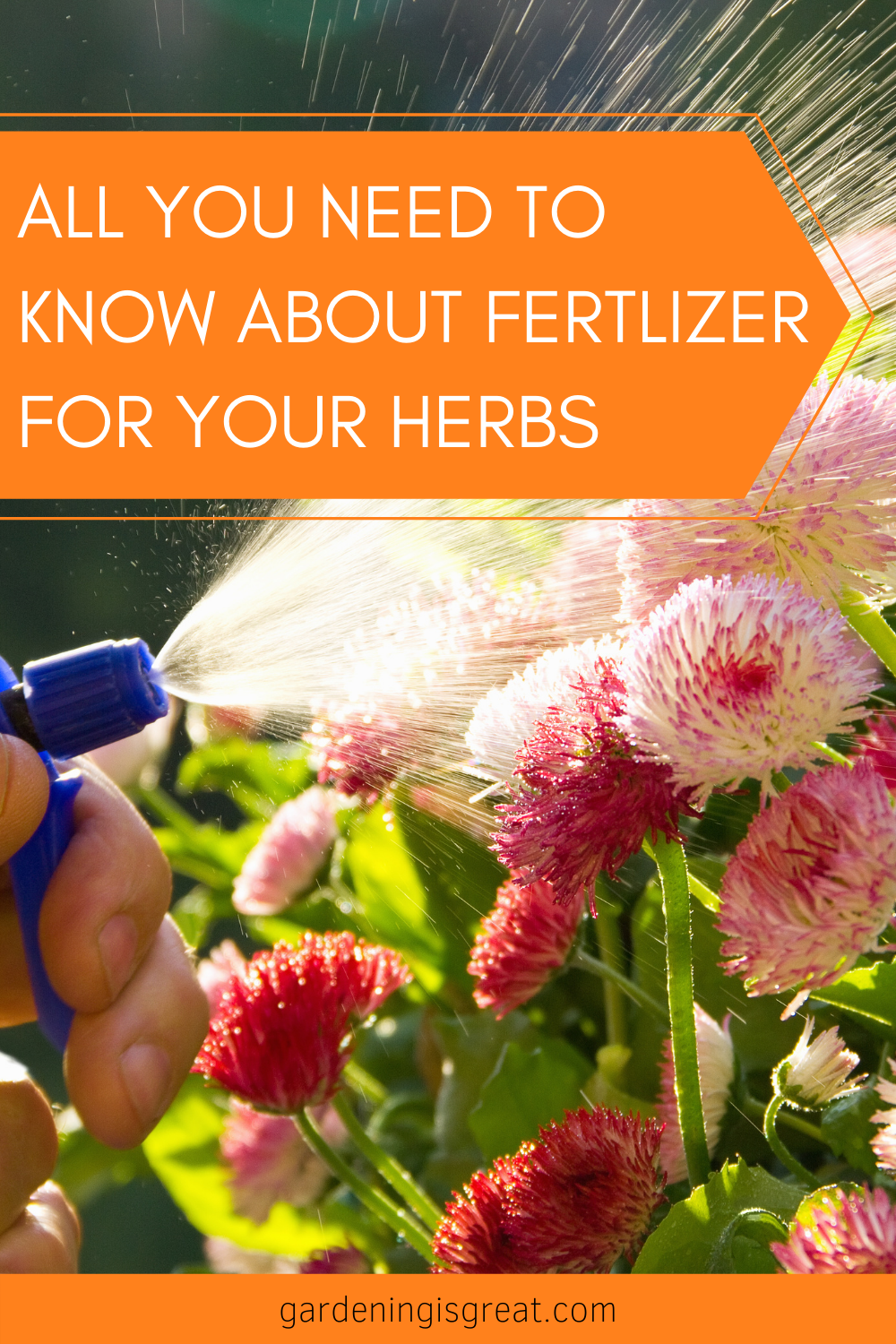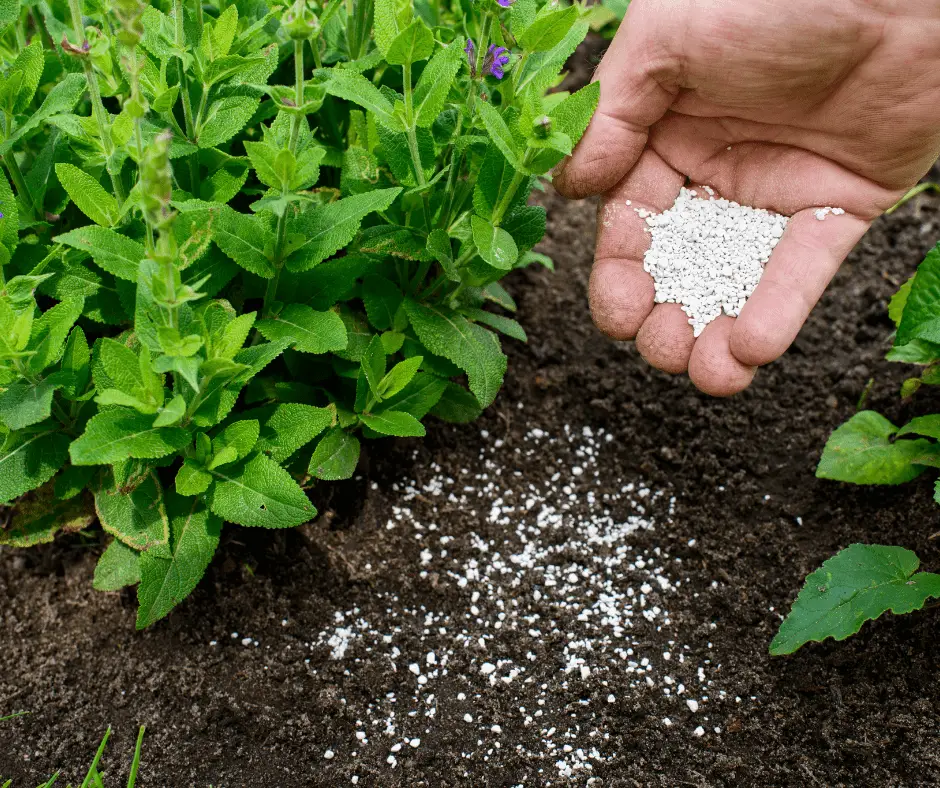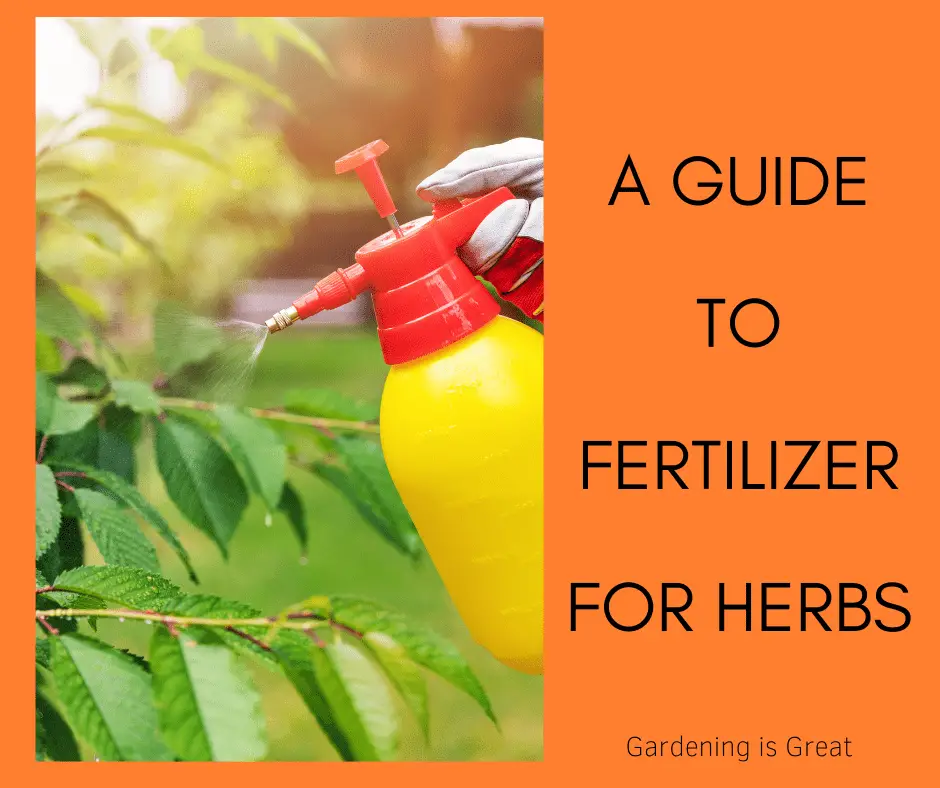Fertilizer For Herbs: All You Need To Know
This post may contain affiliate links. Please see the privacy policy for details.
When looked after well, herbs are some of the easiest plants you can grow. Many do not require much maintenance and regrow year after year.
Once you’ve chosen which herbs you want to grow, have planted your seedlings, and repotted them once germinated, your herb garden is ready to supply you with fresh herbs.
But like all plants, herbs too require certain conditions for optimum growth. They need the right combination of soil, sunlight, and water to thrive.
Most importantly, herbs require food!
Usually, plants naturally get their food from nutrient-rich soil. But depending upon where you live, the soil in your garden might not offer the right combination of nutrients. Even using compost only has a certain amount of nutrients initially to provide a healthy start for your herbs. But then what do you use?
Fertilizer!
Fertilizer for herbs is like food for us. It provides them with the right amount of nutrients that they need to grow strong and healthy.
This post will take a look at the different types of fertilizers, whether you need fertilizer for all types of herbs, and how to use it.

[toc]
Do I Need to Fertilize My Herbs?
In short, yes you do. Herbs require fertilizer as not all soil is equal in providing the nutrients herbs need to grow.
However, with that in mind, not all herbs require the same amount of fertilizer. The amount can vary depending upon the type of herb and also where you choose to plant them.
Types of Herbs
Perennials
Perennial herbs are those that regrow year after year. They often need protecting during the winter months before the first frost by either bringing them indoors or providing them with a covering outdoors.
As perennials are often native to areas where there is dry soil, they tend to grow slowly over a longer period. These are perennials like Mediterranean herbs such as sage, thyme, and lavender.
Perennials will not need as much fertilizer and grow best when supplied with a slow-release fertilizer. This helps ensure that the leaves have time to develop essential oils which are necessary for their strong aroma and flavor.
It also limits the fertilizer from being washed away in the soil when it is released slowly and provides a consistent stream of nutrients.
Annuals
Unlike perennial herbs, annuals grow quickly to flourish for one season and then die in Autumn and Winter. These herbs only last for one growing season but due to growing quickly, can provide you with a large quantity that can be dried or frozen for use later in the year.
Annual herbs have large, thin leaves such as basil or coriander.
The best fertilizer for annual herbs is one that provides a high level of nutrients and is released quickly. With annuals growing in such a short amount of time, the fertilizer can help provide an additional boost to their growing season.
Fertilizer For Potted Herbs vs In The Ground
Another consideration to keep in mind is where you have planted your herbs. Whether you have planted your herbs directly in the ground or containers can change the frequency of fertilizing your herbs.
For herbs grown in containers, require fertilizer more frequently but in smaller amounts than those planted in the ground. This is because potted herbs are watered regularly. In doing so mixes with the fertilizer and leaches nutrients from the soil.
There is also less soil within a pot than the ground which means that fewer nutrients can be held. So it is best to use nutrient-rich soil when transferring your germinated seeds into a pot.
After 4-6weeks, your seedlings will have established and used the nutrients within the soil. They will then require additional nutrients adding to the soil. It is best to dilute the concentration of fertilizer and add this directly to the soil around the roots of your herbs.
For herbs directly planted in the ground, they do not require fertilizer as often as potted herbs. The soil in your garden retains nutrients for longer than that in your pots. It is best to use a slow-release fertilizer and to add this to the bottom of your plants around the soil.
If you apply fertilizer to your plant’s leaves, it can encourage fast growth, which dilutes the herb’s natural essential oils and lowers the quality of flavor and aroma.
A good rule of thumb is to follow your herb’s growth pattern. When they are due a quick growth spurt, this usually applies to annuals in spring, it is a good idea to create a diluted amount of fertilizer to add to your herbs.
For your perennial herbs, try to fertilize them at least once in spring, summer, and autumn. They do not require any fertilizer during the winter months as they naturally grow less with the change in weather and sunlight hours.
If the leaves of your herbs start to turn yellow, it is a sign that they are nutrient-deficient. In this case, you can give them a diluted top-up of fertilizer.

What Fertilizer is Best for Herbs?
Fertilizers are usually listed in two groups:
- Synthetic
- Organic.
Synthetic Fertilizers
Synthetic fertilizers are man-made, unnatural fertilizers often containing ingredients from the petroleum industry. They are used because they are water-soluble and fast-acting. Herbs can obtain the nutrients easily and the results are quick.
However, synthetic fertilizers can do more harm than good. They provide no benefit to the soil or microorganisms around them. They are so powerful that they can even damage your herbs.
Due to the fast-growing response, they generate in your herbs, it can lead to your herbs becoming more susceptible to pests and diseases. Plus, it can decrease the amount of flavor and aroma your herbs produce.
Organic Fertilizers
In comparison, organic fertilizers are created from natural resources such as plants and animals. Though the results are often slower than synthetic fertilizers, the benefits outweigh the cons.
Organic fertilizers are slow releasing. They provide natural food for your herbs over a longer period, ensuring that the growth of your herbs is supported at a natural rate. This helps prevent your herb’s essential oils, taste, and scent to be negatively impacted. Not to mention, being a slow releaser of nutrients helps retain results for longer.
Another benefit of organic fertilizers is that, unlike synthetic fertilizers, organic ones provide nutrients not only to your herbs but to the soil and micro-organisms around them. As organic fertilizers are generated from natural resources, there is no risk of causing harm.

To summarise, all herbs benefit from fertilizer. It provides them with essential nutrients that they may not gain from the soil around them.
Not all herbs, however, require the same amount of fertilizer or frequency, so it is necessary to consider the type of herbs you are growing and where they are planted e.g. in the ground or containers.
Finally, even though synthetic fertilizers may appear appealing to increase plant growth in a short space of time. They are unnatural and harm both your herbs and the soil around them. So it is always best to opt for organic fertilizer. Not only do they benefit your herbs, but also the soil and micro-organisms around them.
Still not sure what herbs you want to plant in your herb garden? Take a look at some of our suggestions for herbs from around the world you can grow at home:
